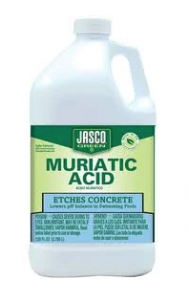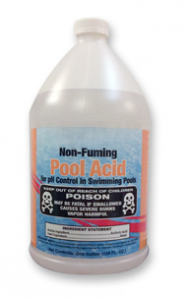In this blog post we'll discuss types and differences of acids to help you make a well-informed decision. So, here you are, surfing websites looking at pool chemicals for your swimming pool. You ask yourself, “What types of acid may I use?” You know that you need to lower your pH and/or alkalinity level, but aren’t sure what specifically to use. This is actually a good question as to the types, and differences may affect your decision regarding what kind to purchase.
Muriatic acid

Most commonly, pool owners will use hydrochloric acid (also known as muriatic acid). These are usually sold in gallon containers and come in liquid form. Most hardware and pool supply stores carry these. Muriatic acid is a corrosive chemical and can also be used for eliminating calcium deposits. This acid will also create a fume that is very hazardous to breathe in or get on your skin, and eyes. So, be very careful when using it!
Dry acid
Next, there is sodium bisulfate (also known as dry acid). Dry acid is basically a powder form of acid. Some pool owners prefer this type as they do not have to worry about the liquid spilling over in enclosed areas. It is easier to be transported and stored. Dry acid must still be handled with care, and can also produce fumes that can cause irritation to the eyes, or skin. It should be dissolved in water before adding it to the swimming pool.
Sulfuric acid

Finally, there is sulfuric acid which is an oxidized solution of sulfur dioxide. This is another liquid acid and is overall more dangerous to handle. However, it is odorless, fumeless, and is cheaper than muriatic acid. Sulfuric acid has the same effects that muriatic acid provides, but will add more total dissolved solids to the water over time. That can affect the efficiency of how other added chemicals work in the pool. It still needs to be handled with care as it can still cause irritation.
In summary, which acid you choose to use is ultimately up to you. What you feel works best for you may not be what’s best for someone else. Handling these types of corrosive chemicals must be done with care, and per the directions. They may not be shippable, as they may not meet the HAZMAT code requirements depending on the area. The amounts needed for your pool will vary based on the type of acid used, your chemistry levels, and the size of the swimming pool. Be sure to check out our “How To Decrease Your Pool Chemical Levels” how-to guide which will provide some tips on adding to your swimming pool. Moving forward, you now have a clearer picture of what you are working with. Shop on!
If you have any other questions about pool and spa products please do let us know - we are here to help!

